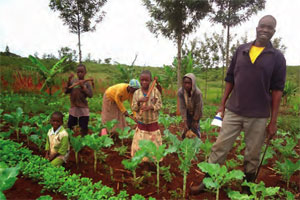The Food and Agriculture Organisation of the United Nations (FAO) has recognised family farmers as central to solving global hunger and malnutrition.

According to FAO, family farming includes all family-based agricultural activities. Family farming is a means of organising agricultural, forestry, fisheries, pastoral and aquaculture production, which is managed and operated by a family and is predominantly reliant on family labor. In addition, FAO reports that, based on data from 93 countries, family farmers account for an average of 80 percent of all holdings, and are the main producers of food that is consumed locally.
“The world cannot do without the family farmer,” says Amy McMillen, Partnerships and Outreach Coordinator for FAO. “It’s because of the family farmer that we eat a variety of healthy foods every day. And yet, family farmers still make up the majority of poor and hungry people in the world. We must do more to incentivise, celebrate and exponentially improve the lives of family farmers to ensure all people have access to fresh, healthy food.”
The face of family farming in North America is dynamic. Results from a new survey of 75 North American family farmers, led by Humanitas Global in collaboration with FAO and Food Tank, were unveiled at the Borlaug Dialogue in Des Moines, Iowa last week. The results demonstrate what is at play for those who have stayed on the farm, chosen to leave the farm or taken up farming for the first time. A consistent takeaway from the results demonstrates that North American-based family farmers remain committed to family farming, despite the challenges that exist.
“The survey results and our conversations with farmers reinforce a deep affinity for family farming, but they also show that farmers are torn between a love for the land and trying to make ends meet,” said Nabeeha M. Kazi, President & CEO of Humanitas Global and Chair of the Community for Zero Hunger. “For those who no longer work the family farm, the importance of feeding their communities and the world remains very much part of their identity.”
Seventy-nine percent of survey respondents who have left the family farm said they remain involved in agriculture in their current careers. In addition, a majority of those who have left the family farm said they intend on returning in the future.
“We do not want the universe of family farmers to shrink, and we must have policies, programs and resources to enable family farmers to stay on the farm if they desire to do so and perform at their potential,” says Kazi. “However, we also cannot overlook the power of those who have left the farm. These individuals have tremendous and highly credible voices as we promote and protect the family farm. We should deploy them to inform policy, shape programs and amplify the story of the family farmer in diverse spaces.”
The greatest challenges for family farmers today include the cost of land, labour costs, government regulations and policies, climate change and the inherent risk of farming, as well as the disproportionate amount of work required given the financial returns.
“The survey results show that family farmers do not rely on farming alone to pay the bills,” says Kazi. “Approximately 67 percent of respondents to the survey said that a family member’s income or additional part-time work supplements income from farming.”
On the positive side, a connection with the land and food systems, independence and working outdoors were all cited as the principle advantages of being a farmer. Those who grew up and remained on farms, those who left farms to pursue other careers and new family farmers all spoke of tending to the land and watching food grow as the most fulfilling aspects of being a farmer.
Family farmers are facing economic challenges and beyond. In addition to tools and resources, family farmers are concerned about issues that all Americans worry about – including providing health care for their families and higher education for their children. And yet, so many people stay on the family farm or are committed to returning, because farming is fulfilling, intellectually stimulating and challenging – and it has shaped their values.
The challenges that family farmers face in the United States and throughout North America mirror the challenges seen globally. Climate change, low profitability and better off-farm opportunities all emerge as the greatest global threats to family farming.
“Recognising the external pressures on family farming, many which the global community can help alleviate, is crucial if we are to make family farming viable and desirable for the next generation,” says McMillan. “FAO celebrates family farmers. We have to be very deliberate and responsive to the needs of the family farmer so they can successfully and profitably do what they love, and that love is feeding and nourishing the world.”
